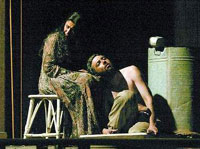 |
|
Two iraqi actors are perfoming a drama named "They Pass
by Here", which describes the tyranny, love and peace before and
after the
war. | |
Iraqi actors hoped the fall of Saddam Hussein would herald a new era of
artistic freedom. But they have seen their dreams destroyed by violence.
With Baghdad racked by bomb attacks, a wave of kidnappings and
widespread crime, few Iraqis bother going to the theater.
"We have lost security and safety. The audience is mentally exhausted,"
said actor Khalil Ibrahim. "How could they bear to watch a play for two or
three hours?"
In the looting and chaos that followed the overthrow of Saddam in April
last year, the National Theater in Baghdad was ransacked. Actors would gather
outside what was left of the building to pick up their meager salaries.
"We sat on the street waiting for our salaries. The National Theater
building was looted and burned," said Qasim al-Sayid, 38. "It was a
tragedy."
Seventeen months later, things have only gotten worse. Actors and
actresses gather each Sunday and Wednesday at the theater to show they are
still present in Baghdad, a condition of the money they receive from the
state.
With the interim government struggling to quell a deadly insurgency and to
rebuild the economy, there is little time and money to be spared for
culture.
"The government was obliged to put other priorities on its list," said
Alla Hussein, 25, an actress and a student of theater at Baghdad's College
of Fine Arts. "Art came last on that list. Actors and actresses were the
first to stop working, and they will be the last to resume their
activities."
Culture Minister Mofeed al-Jazaeri knows very well that his ministry is
not seen as a priority, and is asking for foreign aid to help fund the
revival of cultural activity.
"Electricity is more important than a book. Clean water is more
important than a play. Security is more important than the cinema," he
said. "It seems that culture is not considered on the priority list. That
is why we are seeking the help of international organizations to
compensate for what we lack."
Baghdad's streets are dangerous at night. Few Iraqis like to stay out
too late after dark -- there is the risk of kidnapping or robbery, of
being caught in the crossfire
during battles between guerrillas and U.S.-led forces.
"People are afraid," Sayid said. "The security situation is bad."
Many Iraqis fear that theaters could be targeted by insurgents trying
to sow chaos in the country.
(Agencies) |
伊拉克演员们原本希望萨达姆·侯赛因政权倒台后,艺术界会进入重获自由的新时期,但是他们眼睁睁地看着屡屡发生的暴力事件摧毁了他们的梦想。
巴格达饱受炸弹侵袭之苦,绑架事件频频发生,犯罪活动猖獗,在这种情况下,伊拉克人根本没有心思去剧场看演出。
演员哈利勒·易卜拉希马说:“我们的安全得不到保证。观众们的精神疲惫不堪。他们怎么能忍受观看长达两三个小时的演出呢?”
去年4月,萨达姆政权被推翻后,伊拉克国内掀起了抢劫的狂潮,局势一片混乱,位于巴格达的伊拉克国家剧院也遭到了洗劫。演员们不得不聚集在大楼残骸外面来获取微薄的收入。
38岁的卡西姆·赛义德说:“我们坐在街道上等着拿薪水。国家剧院遭到抢劫和焚烧。这是一个悲剧。”
17个月过去了,事态只是越变越遭。演员们每周三和周日聚集在剧院,表明他们仍然在巴格达,这样他们才能领取国家提供的补助金。
伊拉克临时政府的当务之急是力争平息严重的叛乱,恢复经济,政府无暇顾及也没有多余的资金投入文化领域。
25岁的阿拉·侯赛因是一名演员,同时也是巴格达艺术学院的学生。她说:“政府不得不在议事日程上安排一些更重要的事,艺术在政府的议事日程上排名最后。演员们最先停工,而且他们也将是最后恢复工作的。”
伊拉克文化部长莫夫德·亚扎伊里非常清楚文化部得不到政府的重视,所以他正在寻求外国的帮助,为伊拉克文化活动的复兴筹集资金。
他说:“电比书籍更重要。清洁的水比戏剧更重要。安全比电影更重要。看来文化并没有被列入政府优先考虑的名单上。所以我们只能向国际组织寻求帮助以补偿缺乏的资金。”
夜幕降临后的巴格达街道是不安全的。晚上没有人愿意在外面逗留太久,因为随时都有被绑架或被抢劫的危险,也可能被困在游击队和以美国为首的联军的交火中。
赛义德说:“人们很害怕。安全状况十分糟糕。”
很多伊拉克人担心剧场会成为叛乱分子袭击的对象,他们试图在全国制造混乱。
(中国日报网站译) |
